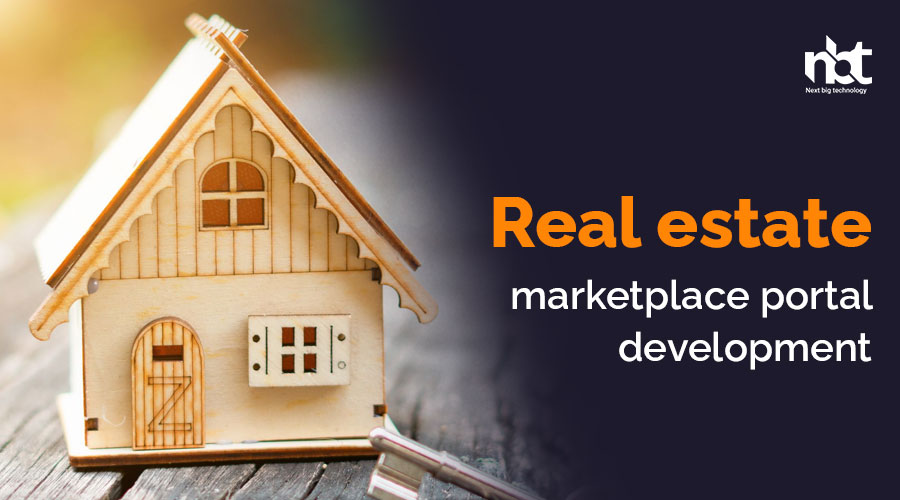Table of Contents
Real estate marketplace portal development Services
In today’s fast-paced digital era, the real estate industry is witnessing a monumental shift towards online platforms. As the demand for efficient property transactions surges, real estate marketplace portal development services emerge as the cornerstone of this transformation. These services not only connect buyers and sellers seamlessly but also revolutionize the way properties are marketed, searched, and transacted.
Understanding Real Estate Marketplace Portal Development Services: Real estate marketplace portal development services cater to the creation of robust online platforms that serve as virtual marketplaces for property transactions. These portals integrate advanced features and functionalities tailored to meet the diverse needs of buyers, sellers, and real estate agents.
Streamlining Property Transactions: One of the primary benefits of utilizing real estate marketplace portal development services is the streamlining of property transactions. These portals offer intuitive user interfaces that allow users to easily list properties, search for desired listings, and communicate with potential buyers or sellers. With features such as advanced search filters, property comparison tools, and interactive maps, users can efficiently navigate through a vast array of listings to find their ideal property.
Enhanced Visibility and Marketing Opportunities: For real estate agents and property developers, marketplace portals serve as powerful marketing platforms to showcase their listings to a global audience. Through strategic optimization techniques and SEO best practices, these portals ensure maximum visibility for listed properties, driving increased traffic and inquiries. Additionally, features such as virtual tours, high-quality images, and comprehensive property descriptions further enhance the marketing appeal, captivating potential buyers and facilitating faster transactions.
Facilitating Secure Transactions: Security is paramount in real estate transactions, and marketplace portal development services prioritize the implementation of robust security measures to safeguard sensitive information and transactions. Secure payment gateways, encryption protocols, and multi-factor authentication mechanisms instill confidence among users, fostering trust and credibility within the platform.
Leveraging Data Insights for Strategic Decision-Making: Real estate marketplace portals generate a wealth of data regarding user behavior, market trends, and property preferences. Through advanced analytics tools and algorithms, this data can be leveraged to gain valuable insights into market dynamics, enabling real estate professionals to make informed decisions and devise targeted marketing strategies.
How to Create a Real estate marketplace portal developmentv
Are you considering stepping into the lucrative world of real estate marketplace portals? With the digital transformation sweeping across industries, creating your own platform for real estate listings can be a rewarding venture. Whether you’re an entrepreneur looking to start a new business or a developer seeking a challenging project, here’s a comprehensive guide on how to create a real estate marketplace portal from scratch.
- Market Research and Planning: Before diving into development, conduct thorough market research to understand the needs and preferences of your target audience. Identify your competitors and analyze their strengths and weaknesses. Define your unique selling proposition (USP) and draft a detailed business plan outlining your goals, target market, revenue model, and marketing strategies.
- Choose the Right Technology Stack: Selecting the appropriate technology stack is crucial for the success of your portal. Consider factors such as scalability, security, and ease of maintenance. Popular choices for building real estate portals include frameworks like Ruby on Rails, Django, Laravel, or platforms like WordPress with plugins such as Real Homes or WP Residence.
- Design and User Experience (UX): A user-friendly interface and intuitive design are paramount for attracting and retaining users. Collaborate with experienced UX/UI designers to create wireframes and prototypes. Focus on features like advanced search filters, interactive maps, high-quality images, and mobile responsiveness to enhance the user experience.
- Development Phase: Begin the development process by setting up the essential features of your portal, including user registration, property listings, search functionality, messaging system, and payment gateway integration. Implement robust security measures to protect user data and transactions. Leverage APIs from property data providers like Zillow or MLS to enrich your listings with comprehensive property information.
- Testing and Quality Assurance: Thoroughly test your portal across different devices, browsers, and operating systems to ensure compatibility and functionality. Conduct usability testing to gather feedback from real users and make necessary improvements. Perform security audits to identify and fix vulnerabilities. Aim for a seamless and bug-free experience before launching your portal.
- Launch and Marketing: Once your portal is ready, launch it with a bang. Develop a marketing strategy encompassing SEO, social media marketing, email campaigns, and partnerships with real estate agents and agencies. Highlight your unique features and benefits to attract users and drive traffic to your platform. Monitor analytics and user feedback to iterate and optimize continuously.
- Post-launch Support and Updates: The journey doesn’t end after the launch. Provide ongoing support to address user inquiries, resolve issues, and implement requested features. Regularly update your portal with new functionalities, performance enhancements, and security patches to stay competitive in the dynamic real estate market.
- Monetization Strategies: Explore various monetization options to generate revenue from your portal. Consider charging subscription fees from agents or property owners for listing properties, offering premium features like highlighted listings or featured properties for an additional fee, or earning commissions from successful property transactions facilitated through your platform.
Why Should You Go for Real estate marketplace portal development
In today’s digital age, the real estate industry is witnessing a paradigm shift. Gone are the days of traditional methods of buying and selling properties; instead, we are now embracing the era of real estate marketplace portals. These online platforms are revolutionizing the way properties are discovered, bought, and sold, offering a plethora of benefits to both buyers and sellers alike.
So, why should you consider investing in real estate marketplace portal development? Let’s delve into the compelling reasons:
- Wider Reach and Accessibility: One of the most significant advantages of a real estate marketplace portal is its ability to reach a vast audience. Unlike traditional methods, which are often limited to local markets, online portals have a global reach, allowing properties to be showcased to potential buyers from around the world. This increased accessibility opens up new avenues for both buyers and sellers, leading to faster transactions and better deals.
- Streamlined Process: Real estate marketplace portals streamline the buying and selling process like never before. Through intuitive interfaces and advanced search algorithms, users can easily browse through thousands of listings, filter their search based on their preferences, and find their dream property in a matter of minutes. This convenience not only saves time but also reduces the hassle associated with traditional methods of property hunting.
- Transparency and Information: Transparency is key in any real estate transaction, and marketplace portals excel in providing accurate and up-to-date information to both buyers and sellers. From detailed property descriptions and high-resolution images to neighborhood insights and market trends, these portals offer a wealth of information that empowers users to make informed decisions. This transparency builds trust and confidence among all parties involved, leading to smoother transactions and fewer disputes.
- Cost-Effectiveness: Developing a real estate marketplace portal may seem like a significant investment initially, but in the long run, it proves to be highly cost-effective. Compared to traditional methods such as print advertising or physical storefronts, online portals offer a much higher return on investment. With lower overhead costs and the ability to target specific demographics, these portals allow real estate professionals to maximize their marketing efforts while minimizing expenses.
- Enhanced User Experience: User experience is paramount in today’s digital landscape, and real estate marketplace portals are designed with this in mind. From responsive design and mobile compatibility to interactive maps and virtual tours, these portals offer a seamless and immersive experience for users across all devices. This focus on usability not only attracts more visitors but also encourages them to stay longer and explore more listings, increasing the chances of successful transactions.
Market Prospects of Custom Real estate marketplace portal development
In today’s rapidly evolving digital landscape, the real estate industry has witnessed a paradigm shift in the way properties are bought, sold, and rented. With the advent of custom real estate marketplace portals, the sector has embraced innovative technologies to streamline operations, enhance user experience, and maximize profitability. This article delves into the burgeoning market prospects of custom real estate marketplace portal development, highlighting key trends, opportunities, and challenges.
- Rising Demand for Customization: Real estate stakeholders, including agents, brokers, developers, and property seekers, are increasingly seeking tailored solutions that cater to their specific needs and preferences. Custom real estate marketplace portals offer the flexibility to integrate unique features, branding elements, and functionalities, thereby enhancing user engagement and satisfaction.
- Technological Advancements Driving Innovation: The convergence of technologies such as artificial intelligence (AI), machine learning (ML), virtual reality (VR), and augmented reality (AR) has revolutionized the real estate sector. Custom portals leverage these advanced technologies to provide immersive property tours, personalized recommendations, predictive analytics, and seamless transactional experiences, thereby gaining a competitive edge in the market.
- Expansion of Online Property Transactions: The global shift towards digitalization has accelerated the adoption of online platforms for property transactions. Custom real estate marketplace portals facilitate end-to-end transactions, including property listings, virtual viewings, negotiations, document management, and secure payments, thereby reducing dependence on traditional offline channels and expanding market reach.
- Growing Investor Interest: The robust growth of the real estate technology (PropTech) sector has attracted significant investments from venture capitalists, private equity firms, and institutional investors. Custom real estate marketplace portal development presents lucrative investment opportunities, particularly in emerging markets where there is a growing demand for digital real estate solutions.
- Emergence of Niche Market Segments: Custom real estate marketplace portals are catering to niche market segments such as luxury properties, commercial real estate, vacation rentals, co-living spaces, and student accommodations. By offering specialized services and curated listings, these portals effectively target specific demographics and capitalize on untapped market opportunities.
- Regulatory and Compliance Challenges: Despite the promising prospects, custom real estate marketplace portal development is not without its challenges. Regulatory compliance, data privacy concerns, cybersecurity risks, and market volatility pose significant hurdles for developers and operators. Navigating these regulatory complexities requires robust legal frameworks and adherence to industry best practices.
- Sustainable Development and ESG Considerations: With increasing emphasis on sustainability and environmental, social, and governance (ESG) criteria, custom real estate marketplace portals are integrating green building certifications, energy-efficient solutions, and socially responsible investment options into their offerings. Embracing sustainable development practices not only aligns with global trends but also enhances brand reputation and attracts eco-conscious investors and consumers.
Essential Features of a Real estate marketplace portal development
In today’s digital age, the real estate industry is undergoing a profound transformation, propelled by the advent of online marketplaces. These platforms serve as dynamic hubs connecting buyers, sellers, agents, and developers, revolutionizing how properties are bought, sold, and rented. However, to thrive in this competitive landscape, a real estate marketplace portal must incorporate essential features tailored to meet the diverse needs of its users. Let’s delve into the key components that constitute a successful real estate portal development:
- User-Friendly Interface: The cornerstone of any successful portal is its ease of use. A clean, intuitive interface enhances user experience, facilitating seamless navigation and interaction. From property search to transaction completion, every step should be effortless and intuitive, ensuring user satisfaction and retention.
- Advanced Search and Filtering: Empowering users with robust search and filtering options is paramount. Implementing advanced search algorithms enables users to refine their property search based on location, price range, amenities, and other relevant criteria, ensuring they find properties that align with their preferences.
- Comprehensive Property Listings: A comprehensive database of property listings is essential for attracting both buyers and sellers. The portal should support various property types, including residential, commercial, and industrial, along with detailed descriptions, high-quality images, virtual tours, and floor plans to provide users with a comprehensive understanding of each property.
- Responsive Design: In an era dominated by mobile devices, ensuring a responsive design is imperative. The portal must seamlessly adapt to different screen sizes and devices, providing users with a consistent experience across desktops, smartphones, and tablets.
- Secure Payment Gateway: Facilitating secure transactions is paramount for building trust and credibility. Integrating a reliable payment gateway with robust encryption ensures the security of financial transactions, instilling confidence in users and facilitating seamless property transactions.
- Agent and Developer Profiles: Providing users with access to verified agent and developer profiles fosters transparency and trust. Detailed profiles showcasing professional credentials, experience, and client testimonials enable users to make informed decisions when selecting agents or developers to engage with.
- Interactive Maps and Geolocation: Integrating interactive maps and geolocation features enriches the user experience by offering spatial context to property listings. Users can visualize property locations, nearby amenities, schools, and transportation links, empowering them to make informed decisions based on location-specific factors.
- Real-Time Notifications: Keeping users informed about new listings, price changes, and relevant market trends is essential for user engagement. Implementing real-time notification features via email or push notifications ensures users stay updated and actively engaged with the platform.
- Integrated CRM System: A robust Customer Relationship Management (CRM) system streamlines communication and enhances user engagement. Agents can manage leads, schedule appointments, and track client interactions, optimizing their workflow and fostering long-term relationships with clients.
- Analytics and Reporting: Leveraging data analytics tools provides valuable insights into user behavior, market trends, and performance metrics. Analyzing user interactions, conversion rates, and property trends enables administrators to make data-driven decisions, optimize marketing strategies, and enhance the overall effectiveness of the portal.
Advanced Features of a Real estate marketplace portal development
In the ever-evolving landscape of real estate, technology continues to play a pivotal role in transforming the way properties are bought, sold, and managed. Real estate marketplace portals have emerged as powerful platforms connecting buyers, sellers, agents, and developers in a seamless digital ecosystem. As these portals become more sophisticated, they offer an array of advanced features designed to enhance user experience and streamline transactions. Let’s delve into some of the advanced features shaping the future of real estate marketplace portal development.
- AI-Powered Search and Recommendation Engine: One of the key advancements in real estate portals is the integration of artificial intelligence (AI) algorithms to deliver personalized property recommendations. By analyzing user preferences, browsing history, and behavior patterns, AI-driven search engines can suggest relevant listings, increasing the chances of finding the perfect property match.
- Virtual Property Tours and 3D Visualization: With the advent of virtual reality (VR) and augmented reality (AR) technologies, real estate portals now offer immersive virtual property tours. Users can explore properties remotely, experiencing them as if they were physically present. 3D visualization allows for a realistic depiction of properties, giving buyers a comprehensive understanding of space and layout before scheduling an in-person visit.
- Blockchain-Powered Transactions: Blockchain technology is revolutionizing the real estate industry by providing transparent, secure, and immutable transaction records. Real estate marketplace portals leverage blockchain for smart contracts, enabling seamless, trustless transactions between buyers and sellers. Smart contracts automatically execute terms and conditions once predefined criteria are met, eliminating the need for intermediaries and reducing the risk of fraud.
- Predictive Analytics for Market Trends: Data-driven insights are invaluable for both buyers and sellers in making informed decisions. Real estate portals utilize predictive analytics to analyze market trends, pricing dynamics, and demand-supply patterns. By leveraging big data, users can gain valuable insights into property appreciation, rental yields, and investment potential, empowering them to make strategic choices.
- Integrated Mortgage and Financing Options: Many real estate marketplace portals now offer integrated mortgage and financing solutions, simplifying the home buying process. Users can explore various loan options, calculate mortgage payments, and even initiate loan applications directly through the portal. Seamless integration with financial institutions streamlines the approval process, facilitating faster transactions.
- Multilingual Support and Global Reach: As real estate markets become increasingly globalized, multilingual support is essential for catering to a diverse clientele. Advanced portals offer language localization features, ensuring that users can access information in their preferred language. Additionally, integration with international listing databases expands the reach of portals, allowing users to explore properties worldwide.
- Social Media Integration and Networking: Real estate marketplace portals are embracing social media integration to enhance networking and community engagement. Users can share listings, gather feedback, and connect with real estate professionals through social media platforms directly from the portal interface. This seamless integration fosters collaboration and facilitates information sharing within the real estate community.
- Mobile Optimization and Responsive Design: With the increasing prevalence of mobile devices, real estate portals prioritize mobile optimization and responsive design. Mobile-friendly interfaces ensure a seamless browsing experience across smartphones and tablets, allowing users to access listings, communicate with agents, and manage transactions on the go.
Real estate marketplace portal development Timelines
In the dynamic realm of real estate, the digital landscape has become increasingly vital. The emergence of real estate marketplace portals has revolutionized the industry, offering a seamless platform for buyers, sellers, and agents to connect. However, the development of such portals is not instantaneous; it involves meticulous planning, execution, and adherence to timelines. Let’s delve into the key stages and timelines involved in the development of a real estate marketplace portal.
- Conceptualization (1-2 weeks): The journey begins with conceptualization. During this phase, stakeholders brainstorm ideas, identify target audiences, outline features, and set project goals. Market research is conducted to understand user preferences, competitor analysis, and technological requirements.
- Planning (2-3 weeks): Once the concept is finalized, the planning phase commences. Project managers outline the project scope, budget, and resources required. Wireframes and mock-ups are created to visualize the portal’s layout and functionality. Technical specifications and architecture are also defined during this stage.
- Design (3-4 weeks): Designing is a crucial aspect of portal development. User experience (UX) and user interface (UI) designers work collaboratively to create visually appealing and intuitive designs. This stage involves creating prototypes, selecting color schemes, typography, and graphics to ensure a seamless user journey.
- Development (8-12 weeks): The development phase involves turning designs into a fully functional portal. Front-end developers work on the user-facing aspects, ensuring responsiveness across devices. Back-end developers focus on database management, server-side logic, and integration of essential features such as property listings, search filters, and user accounts. Continuous testing and debugging are conducted to identify and rectify any issues.
- Testing and Quality Assurance (4-6 weeks): Quality assurance (QA) engineers rigorously test the portal to ensure it meets performance, security, and usability standards. Various testing methodologies such as functionality testing, compatibility testing, and security testing are employed to identify and address any bugs or glitches.
- Deployment (1-2 weeks): Upon successful testing, the portal is ready for deployment. Deployment involves transferring the portal from the development environment to the live server. It also includes configuring domain settings, setting up hosting infrastructure, and ensuring data migration is seamless.
- Post-Launch Support and Maintenance (Ongoing): Even after the portal goes live, the journey doesn’t end. Continuous support and maintenance are essential to address user feedback, implement updates, and ensure optimal performance. This phase involves monitoring site traffic, resolving technical issues, and incorporating new features based on evolving market trends.
How Much Does It Cost to Build a Real estate marketplace portal development?
In the digital age, real estate marketplaces have become indispensable tools for both property buyers and sellers. These platforms offer convenience, accessibility, and a vast array of options, making them essential in the modern property market. However, the development of a real estate marketplace portal is not without its costs. Understanding these costs is crucial for anyone looking to venture into this domain.
- Platform Development: The primary cost involved in building a real estate marketplace portal is platform development. This encompasses everything from designing the user interface (UI) and user experience (UX) to backend development and database integration. The complexity of the platform, as well as the features and functionalities required, will significantly impact the cost in this phase.
- Features and Functionalities: Real estate marketplaces require a wide range of features and functionalities to cater to the needs of both buyers and sellers. These may include property search filters, listing management tools, communication channels (such as chat or messaging systems), virtual tours, map integrations, and secure payment gateways. Each additional feature adds to the overall development cost.
- Mobile Responsiveness: With the increasing use of smartphones, having a mobile-responsive platform is essential for reaching a broader audience. Developing mobile apps for iOS and Android platforms, or ensuring that the website is optimized for mobile devices, incurs additional costs but is crucial for the success of the portal.
- Security Measures: Security is paramount in real estate marketplaces, given the sensitive nature of property transactions. Implementing robust security measures to protect user data, prevent fraud, and secure financial transactions is a non-negotiable expense. This may include SSL certificates, encryption protocols, and compliance with data protection regulations such as GDPR.
- Integration with Third-Party Services: To enhance functionality and provide a seamless user experience, real estate marketplaces often integrate with third-party services such as property valuation tools, mortgage calculators, and CRM systems. Integrations incur additional costs and require ongoing maintenance and updates.
- Maintenance and Support: Building a real estate marketplace portal is not a one-time investment. Ongoing maintenance and support are essential to ensure the platform remains functional, secure, and up-to-date with the latest technologies and market trends. Budgeting for post-launch maintenance is crucial for the long-term success of the portal.
- Marketing and Promotion: Once the portal is developed, marketing and promotion are essential to attract users and drive traffic to the platform. This may include digital marketing strategies such as search engine optimization (SEO), social media marketing, email campaigns, and paid advertising. Allocating a budget for marketing expenses is vital to ensure the portal gains visibility and traction in the competitive real estate market.
How to Create a Real estate marketplace portal development – Team and Tech Stack
In today’s digital age, the real estate industry is evolving rapidly, with online marketplaces becoming increasingly popular for buying, selling, and renting properties. Creating a successful real estate marketplace portal requires careful planning, a skilled team, and the right technology stack. In this guide, we’ll delve into the essential aspects of building such a platform, including the ideal team structure and the recommended technology stack.
1. Understanding the Project Scope: Before diving into development, it’s crucial to have a clear understanding of the project scope. Define your target audience, features you want to include, and the unique value proposition of your portal. Whether it’s focusing on a specific geographic location, property type, or catering to niche markets, clarity on these aspects will guide your development process.
2. Building the Right Team: Creating a real estate marketplace portal requires a multidisciplinary team with expertise in various domains. Here’s a breakdown of the roles you’ll need:
- Project Manager: Oversees the entire development process, ensuring timely delivery and adherence to requirements.
- UI/UX Designer: Designs intuitive user interfaces and seamless user experiences.
- Frontend Developer: Translates designs into responsive web interfaces using HTML, CSS, and JavaScript.
- Backend Developer: Builds the server-side logic, database architecture, and ensures seamless integration of features.
- Quality Assurance (QA) Engineer: Conducts rigorous testing to identify and fix bugs, ensuring the platform’s stability.
- DevOps Engineer: Manages deployment, infrastructure, and ensures scalability and security of the platform.
3. Choosing the Right Technology Stack: Selecting the appropriate technology stack is crucial for the performance, scalability, and security of your real estate marketplace portal. Here’s a recommended tech stack:
- Frontend: Use frameworks like React.js or Vue.js for building dynamic and responsive user interfaces.
- Backend: Opt for robust backend technologies like Node.js, Django, or Ruby on Rails to handle server-side logic and API integrations.
- Database: Consider using databases like PostgreSQL or MongoDB for storing property listings, user data, and other relevant information.
- Hosting: Choose reliable cloud hosting services like AWS, Google Cloud, or Azure for scalability and reliability.
- Security: Implement HTTPS protocol, encryption, and authentication mechanisms to ensure data security and user privacy.
- Payment Gateway: Integrate secure payment gateways like PayPal, Stripe, or Braintree for seamless transactions.
4. Iterative Development and Testing: Adopt an iterative development approach, breaking down the project into manageable sprints. Continuously gather feedback from stakeholders and users, incorporating improvements and enhancements throughout the development cycle. Rigorous testing at each stage ensures the platform’s functionality, usability, and performance.
5. Launch and Market Your Portal: Once your real estate marketplace portal is developed and thoroughly tested, it’s time to launch it to the public. Develop a comprehensive marketing strategy to attract users, including real estate agents, property buyers, and renters. Utilize digital marketing channels, social media, and partnerships with real estate agencies to increase visibility and drive traffic to your platform.
Real estate marketplace portal development Process
In today’s digital age, the real estate industry has undergone a significant transformation with the emergence of online marketplace portals. These platforms provide a convenient avenue for buyers, sellers, and real estate professionals to connect, list properties, and facilitate transactions. The development process of these portals involves a comprehensive approach that integrates technology, user experience, and industry-specific features. Let’s delve into the intricacies of building a successful real estate marketplace portal.
- Market Research and Analysis: Before diving into the development phase, thorough market research is conducted to understand the needs and preferences of users, existing competition, and emerging trends in the real estate sector. This analysis helps in identifying target demographics, defining unique selling points, and determining the scope of the portal.
- Defining Features and Functionality: Based on the insights gathered from market research, the next step involves outlining the core features and functionality of the portal. This includes property listings, advanced search options, interactive maps, virtual tours, user profiles, messaging systems, and secure payment gateways. Customization options for property listings and intuitive navigation are essential to enhance user experience.
- Technology Stack Selection: Choosing the right technology stack is crucial for the efficient performance and scalability of the portal. Factors such as security, database management, mobile responsiveness, and third-party integrations are taken into consideration. Commonly used technologies include PHP, Python, Ruby on Rails for backend development, and frameworks like React.js or AngularJS for frontend development.
- User Interface (UI) and User Experience (UX) Design: The design phase focuses on creating an intuitive and visually appealing interface that enhances user engagement. Wireframing and prototyping are utilized to map out the layout, navigation flow, and interaction elements. Attention is paid to mobile responsiveness, ensuring seamless access across devices.
- Development and Testing: The development process involves coding, database integration, and implementation of features according to the predefined requirements. Agile methodologies are often employed to facilitate iterative development and accommodate changes. Rigorous testing is conducted at each stage to identify and rectify any bugs or performance issues, ensuring a smooth user experience.
- Integration of Advanced Technologies: To stay ahead in the competitive real estate market, integration of advanced technologies such as artificial intelligence (AI), machine learning, and augmented reality (AR) can add value to the portal. AI-driven algorithms can personalize property recommendations based on user preferences, while AR technology enables virtual staging and immersive property tours.
- Security and Compliance: Security measures such as data encryption, secure authentication mechanisms, and regular security audits are implemented to safeguard sensitive user information and financial transactions. Compliance with industry regulations and data protection laws such as GDPR is essential to build trust and credibility among users.
- Launch and Marketing: Upon completion of development and testing, the portal is launched to the public with a comprehensive marketing strategy in place. This includes search engine optimization (SEO), social media marketing, content marketing, and targeted advertising campaigns to attract users and drive traffic to the platform.
- Continuous Monitoring and Optimization: Post-launch, continuous monitoring of user feedback, website analytics, and performance metrics is essential to identify areas for improvement and optimization. Regular updates, feature enhancements, and scalability upgrades ensure the portal remains competitive and adapts to evolving market trends.
Next Big Technology – Your Trusted Real estate marketplace portal development Partner
In the digital age, the real estate industry is witnessing a significant shift towards online platforms. As more buyers and sellers turn to the internet to facilitate property transactions, the demand for reliable and efficient real estate marketplace portals is on the rise. In this dynamic landscape, selecting the right technology partner for developing such portals becomes crucial. Enter the Next Big Technology – your trusted ally in navigating the realm of real estate marketplace portal development.
Why Choose Next Big Technology?
- Expertise in Real Estate Technology: Next Big Technology specializes in creating tailored solutions for the real estate sector. With years of experience and a deep understanding of industry trends, they possess the expertise to develop cutting-edge marketplace portals that cater to the unique needs of clients.
- Customized Solutions: Understanding that one size does not fit all, Next Big Technology offers customizable solutions to match the specific requirements of each client. Whether it’s a residential, commercial, or rental marketplace, they have the capability to design and develop portals that meet diverse business objectives.
- User-Centric Design: User experience is paramount in the success of any online platform. Next Big Technology prioritizes user-centric design, ensuring that the marketplace portals they develop are intuitive, visually appealing, and easy to navigate. By placing the user at the center of the design process, they enhance engagement and drive conversions.
- Robust Technology Stack: Next Big Technology leverages state-of-the-art technology stack to build robust and scalable marketplace portals. From front-end development using HTML5, CSS3, and JavaScript frameworks to back-end development with languages like PHP and Python, they employ the latest tools and technologies to deliver high-performance solutions.
- Seamless Integration: Integration with third-party tools and services is essential for enhancing the functionality of real estate marketplace portals. Whether it’s integrating payment gateways, CRM systems, or property management tools, Next Big Technology ensures seamless integration to streamline operations and provide a superior user experience.
- Ongoing Support and Maintenance: The journey doesn’t end with the launch of the portal. Next Big Technology offers comprehensive support and maintenance services to ensure the smooth functioning of the marketplace portals. Whether it’s troubleshooting technical issues, implementing updates, or scaling the platform as the business grows, they are committed to providing ongoing support to their clients.
Enterprise Real estate marketplace portal development
In today’s dynamic real estate landscape, staying ahead of the curve is not just advantageous, it’s essential. With the advent of enterprise real estate marketplace portal development, the industry is undergoing a transformative shift towards efficiency, transparency, and scalability like never before.
Gone are the days of traditional, fragmented approaches to property transactions. Enterprise marketplace portals are ushering in a new era of centralized platforms that streamline the entire real estate ecosystem, from listing and discovery to financing and closing deals. This paradigm shift is not only reshaping the way properties are bought, sold, and managed but also opening up a world of possibilities for stakeholders across the board.
One of the key benefits of enterprise real estate marketplace portals is the consolidation of data and services onto a single, integrated platform. By aggregating listings from various sources, including brokers, developers, and homeowners, these portals offer users unparalleled access to a comprehensive inventory of properties. This not only simplifies the search process for buyers and tenants but also enhances the visibility of listings for sellers and landlords, leading to faster transactions and higher conversions.
Moreover, enterprise marketplace portals leverage advanced technologies such as artificial intelligence and machine learning to deliver personalized recommendations and insights to users. By analyzing user preferences, search behavior, and market trends, these portals can suggest relevant properties, predict demand, and even optimize pricing strategies, thereby maximizing value for both buyers and sellers.
Furthermore, enterprise real estate marketplace portals facilitate seamless collaboration and communication among stakeholders through features such as messaging, document sharing, and transaction management tools. Whether it’s negotiating terms, conducting due diligence, or coordinating logistics, these portals provide a centralized hub for all parties involved, resulting in smoother, more efficient transactions.
From a strategic standpoint, enterprise marketplace portals offer real estate companies a competitive edge by providing them with a scalable platform for growth and innovation. By digitizing and automating various aspects of the real estate lifecycle, these portals enable companies to streamline operations, reduce costs, and accelerate time-to-market. Additionally, by harnessing the power of data analytics, companies can gain valuable insights into market dynamics, customer behavior, and emerging trends, enabling them to make informed decisions and stay ahead of the curve.
Top Real estate marketplace portal development Companies
In the ever-evolving world of real estate, technology has become an indispensable tool for buyers, sellers, and agents alike. With the increasing demand for online solutions, real estate marketplace portals have emerged as essential platforms connecting property seekers with listings and agents. In this article, we’ll explore five top companies that excel in developing real estate marketplace portals.
-
-
Next Big Technology:
Next Big Technology is one of the top development companies for the high-quality development of mobile apps and web development services. They have having experienced in-house team of developers who provide top-notch development services according to the business requirements. NBT provides highly business-oriented services and implements all the latest and trending tools and technologies. They always work hard to deliver a top-notch solution at an affordable cost. They are having experience of more than 13 years and delivered lots of projects around the globe to businesses and clients.
NBT is highly focused on providing top-notch development solutions at a very affordable cost. By using their market experience and development experience, they are delivering proper solutions to clients and various industries for their custom requirements.
Location: India, USA, UK, Australia
Hourly Rate :< $25 per Hour
Employees: 50 – 249
Focus Area
- Mobile App Development
- App Designing (UI/UX)
- Software Development
- Web Development
- AR & VR Development
- Big Data & BI
- Cloud Computing Services
- DevOps
- E-commerce Development
Industries Focus
- Art, Entertainment & Music
- Business Services
- Consumer Products
- Designing
- Education
- Financial & Payments
- Gaming
- Government
- Healthcare & Medical
- Hospitality
- Information Technology
- Legal & Compliance
- Manufacturing
- Media
-
- Zillow Group: Zillow needs no introduction in the real estate industry. As a leading online real estate marketplace, Zillow Group offers robust portal development services powered by cutting-edge technology. Their solutions encompass everything from property listings and market insights to mortgage calculators and virtual tours. With a vast user base and a wealth of data, Zillow Group delivers unparalleled value to clients looking to establish their presence in the digital real estate market.
- Appnovation: Appnovation is renowned for its innovative approach to real estate technology solutions. Leveraging their expertise in mobile app development and web design, they create intuitive and visually stunning marketplace portals that captivate users. Appnovation’s portals are not only aesthetically pleasing but also highly functional, incorporating advanced features such as AI-driven recommendations and integrated communication tools.
- MLSDev: MLSDev specializes in developing custom real estate marketplace portals that prioritize scalability and performance. With a focus on responsive design and seamless integration with MLS databases, their portals ensure up-to-date listings and accurate property information. MLSDev also offers comprehensive backend solutions for managing listings, agents, and transactions, making them a preferred choice for businesses seeking a complete real estate platform.
- Intellectsoft: Intellectsoft is a global technology consulting firm known for its expertise in building enterprise-grade software solutions. In the realm of real estate, they offer bespoke marketplace portal development services tailored to the specific requirements of their clients. Intellectsoft’s portals are characterized by their robust architecture, security features, and advanced analytics capabilities, empowering businesses to make informed decisions and stay ahead of the competition.
FAQs on Real estate marketplace portal development
In today’s dynamic real estate market, the development of a robust online marketplace portal has become increasingly essential. These platforms serve as a bridge between buyers, sellers, agents, and developers, offering a seamless avenue for property transactions. However, navigating the intricacies of real estate marketplace portal development can be daunting for many. To shed light on this topic, let’s delve into some frequently asked questions:
1. What is a real estate marketplace portal? A real estate marketplace portal is an online platform that facilitates the buying, selling, renting, or leasing of properties. It typically features listings from various sources, including individual sellers, real estate agents, and developers, allowing users to browse through a wide range of properties and connect with relevant stakeholders.
2. What are the key features of a successful real estate marketplace portal? A successful real estate marketplace portal incorporates features such as advanced search filters, property listings with detailed descriptions and images, interactive maps, user profiles, messaging systems, secure payment gateways, and analytics tools. Additionally, integration with third-party services like mortgage calculators and legal documentation platforms can enhance the user experience.
3. How can I monetize a real estate marketplace portal? There are several monetization strategies for real estate marketplace portals, including listing fees, subscription plans for agents and developers, featured listings, advertising spaces, lead generation services, and referral commissions. Choosing the right monetization model depends on factors such as the target audience, market dynamics, and competitive landscape.
4. What technologies are used in real estate marketplace portal development? Real estate marketplace portals leverage a variety of technologies, including web development frameworks like React, Angular, or Vue.js for frontend development, backend technologies such as Node.js or Django, databases like MongoDB or PostgreSQL, and cloud infrastructure providers like AWS or Azure. Additionally, integration with APIs for property data, geolocation services, and payment gateways is crucial for functionality.
5. How can I ensure security and data privacy on my real estate marketplace portal? Ensuring security and data privacy is paramount in real estate marketplace portal development. Implementing SSL encryption, robust user authentication mechanisms, data encryption protocols, regular security audits, and compliance with data protection regulations such as GDPR are essential steps. Moreover, educating users about best practices for online security can help mitigate risks.
6. What are the challenges associated with real estate marketplace portal development? Some common challenges in real estate marketplace portal development include aggregating and verifying property data from multiple sources, ensuring platform scalability to handle increasing traffic and listings, optimizing search algorithms for relevance and accuracy, addressing legal and regulatory requirements, and fostering trust among users in a competitive market.
7. How can I drive traffic and engagement to my real estate marketplace portal? Driving traffic and engagement requires a multi-faceted approach, including search engine optimization (SEO) techniques such as keyword optimization, content marketing through blogs and articles, social media promotion, email marketing campaigns, partnerships with real estate agencies and developers, and providing valuable tools and resources for users, such as property valuation calculators or neighborhood guides.
Thanks for reading our post “Real estate marketplace portal development”. Please connect with us to learn more about the Real estate marketplace portal.
























